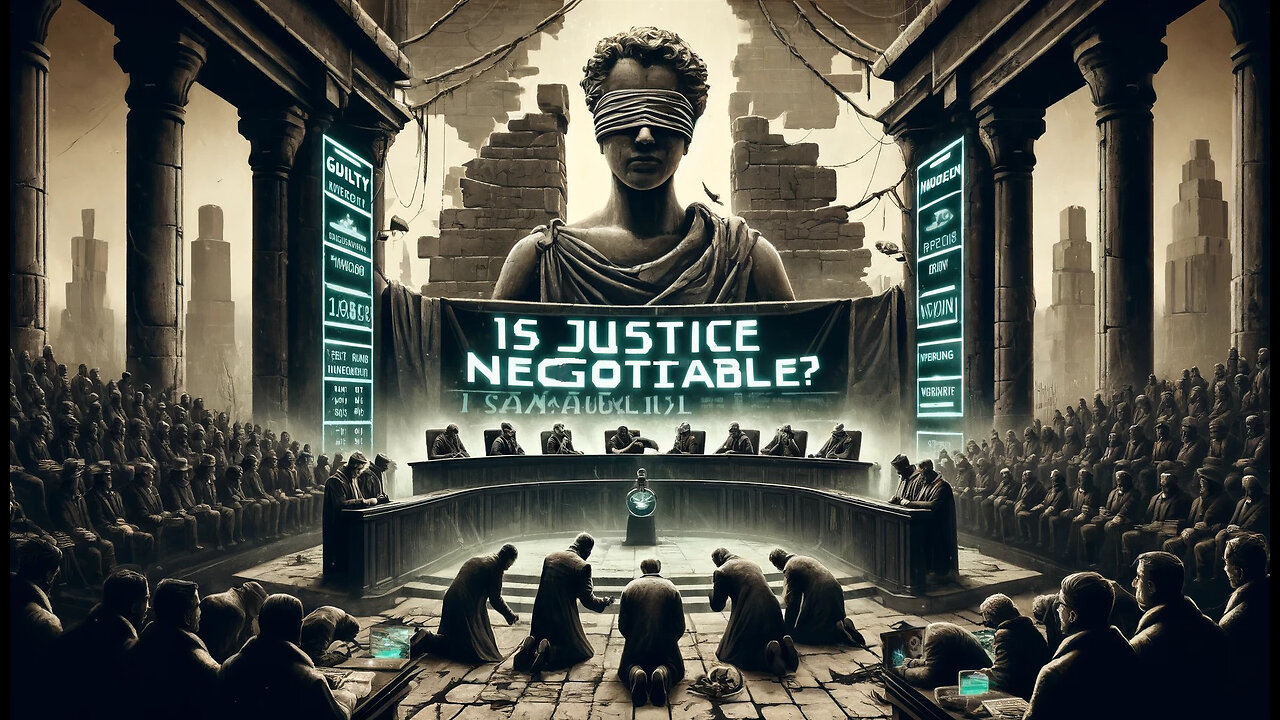Premium Only Content

1 Samuel 15 | Is Justice Negotiable? Can It Be Bargained?
#JusticeNegotiable #1Samuel15 #Justice #Obedience #Compassion #Deviation #Consequence #Alignment
Is Justice Negotiable? 1 Samuel 15 frames this question not in abstract theory, but in the tension between divine command and human compromise. Saul, tasked with executing total judgment against Amalek, chooses partial obedience—sparing the best livestock and the Amalekite king. What unfolds is not just a failure of leadership, but a confrontation with the very nature of justice: whether it can be adjusted, softened, bargained with. The answer given through Samuel is sharp: to obey is better than sacrifice. In this moment, justice is not a spectrum—it is a line, and Saul crosses it.
The idea of Justice here is not about fairness as we often define it, but about alignment with divine will—justice as covenantal fidelity. It is less about retribution and more about rightness in the structure of sacred order. When justice is spoken of in this context, it is absolute not because it is cruel, but because it is whole. It does not bend to convenience or sentiment. It names what must be done when evil has taken root too deeply.
Yet Saul’s deviation introduces Obedience into the equation—not as blind compliance, but as the test of trust. Saul believes he can reinterpret the command, soften its edge, repackage disobedience as religious offering. But obedience, in Samuel’s rebuke, is not about action alone—it is about posture. It is the willingness to follow without editing. In this framing, justice fails not when judgment is carried out, but when self-interest dresses itself as mercy.
Still, underneath the narrative, we sense a pull toward Compassion—or perhaps its distortion. Was Saul moved by pity? By pride? By politics? His choice to spare may seem merciful, but it is not rooted in divine discernment—it is self-directed. True compassion would require deeper understanding, sacred timing, alignment with a greater will. Saul’s mercy is not guided by grace—it is unmoored. And when compassion is unmoored from obedience, it becomes compromise.
These elements converge to reveal the inner logic of this moment. Justice resisted through half-measures produces Deviation—a veering from the path that reveals the heart’s division. Obedience forsaken in favor of performance results in Consequence—not as punishment, but as the unraveling of trust and authority. And justice misunderstood as flexible leads to a failure of Alignment—where human reasoning cannot substitute for divine clarity. In 1 Samuel 15, justice is not negotiable—not because God is unyielding, but because truth becomes distorted the moment it is treated as a bargaining chip. The lesson is not the harshness of command, but the danger of believing love can thrive in disobedience.
-
 LIVE
LIVE
BonginoReport
1 hour agoICE Agents, Facilities Under Attack - Nightly Scroll w/ Hayley Caronia (Ep.141)
22,550 watching -
 LIVE
LIVE
The Charlie Kirk Show
1 minute agoTPUSA Presents This is The Turning Point Tour LIVE with Megyn Kelly
96 watching -
 LIVE
LIVE
The Jimmy Dore Show
33 minutes agoNew Footage Shows Charlie Kirk Shot FROM BEHIND! Google ADMITS To COVID Censorship! w/John Kiriakou
4,164 watching -
 LIVE
LIVE
Dr Disrespect
7 hours ago🔴LIVE - DR DISRESPECT - WHAT THE HELL IS THIS GAME?
1,768 watching -
 LIVE
LIVE
Kim Iversen
3 hours agoFrom Jillian Michaels to Jimmy Kimmel — Give Me A Tylenol, The World’s Gone Crazy
1,597 watching -
 LIVE
LIVE
SpartakusLIVE
1 hour ago#1 Challenge CHAMPION of WZ || Ridin' The GRAVY Train w/ GloryJean
63 watching -
 1:07:43
1:07:43
TheCrucible
2 hours agoThe Extravaganza! EP: 42 (9/24/25)
33.7K3 -
 LIVE
LIVE
Bannons War Room
7 months agoWarRoom Live
16,389 watching -
 LIVE
LIVE
Barry Cunningham
2 hours agoANOTHER ICE ATTACK! PRESIDENT TRUMP NEEDS GO FULLY UNLEASHED!
1,546 watching -
 LIVE
LIVE
StoneMountain64
5 hours agoCoD NEXT Black Ops 7 prep getting my movement back
129 watching